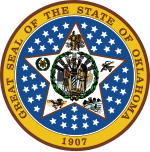Our website is made possible by displaying online advertisements to our visitors.
Please consider supporting us by disabling your ad blocker.
Oklahoma Legislature
Oklahoma Legislature | |
|---|---|
| 59th Oklahoma Legislature | |
 Seal of Oklahoma | |
| Type | |
| Type | |
| Houses | Senate House of Representatives |
Term limits | 12 year cumulative total, in either or both chambers |
| History | |
New session started | January 3, 2023 |
| Leadership | |
| Structure | |
| Seats | 149 48 Senate 101 House |
 | |
Senate political groups |
|
 | |
House political groups |
|
| Authority | Article V, Oklahoma Constitution |
| Salary | $38,400 |
| Elections | |
Last Senate election | 2024 Oklahoma Senate election |
Last House election | 2024 Oklahoma House of Representatives election |
Next Senate election | 2026 Oklahoma Senate election |
Next House election | 2026 Oklahoma House of Representatives election |
| Meeting place | |
 | |
| Oklahoma State Capitol Oklahoma City | |
| Website | |
| Oklahoma Legislature | |
 |
|---|
The Legislature of the State of Oklahoma is the state legislative branch of the U.S. state of Oklahoma. The Oklahoma House of Representatives and Oklahoma Senate are the two houses that make up the bicameral state legislature. There are 101 state representatives, each serving a two-year term, and 48 state senators, who serve four-year terms that are staggered so only half of the Oklahoma Senate districts are eligible in each election cycle. Legislators are elected directly by the people from single member districts of equal population. The Oklahoma Legislature meets annually in the Oklahoma State Capitol in Oklahoma City.
The Oklahoma Constitution vests all legislative powers of the state government in the state legislature, which exercises legislative power by enacting Oklahoma law. The legislature may legislate on any subject and has certain "necessary and proper" powers as may be required for carrying into effect the provisions of the Oklahoma Constitution. The powers of the legislature are only limited by the powers reserved to the people, namely initiative and referendum.
The Oklahoma Senate and the Oklahoma House of Representatives are co-equal houses, but each chamber has exclusive powers. The Oklahoma Senate's advice and consent is required for gubernatorial appointments to high-level executive positions. Bills for raising revenue may only originate in the Oklahoma House of Representatives. Bills approved by the legislature must be sent to the Governor of Oklahoma for approval.
Previous Page Next Page


